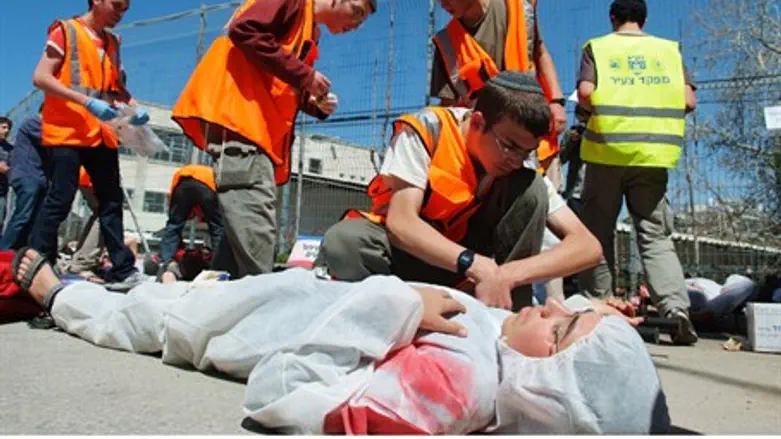
Students of the Mercaz HaRav yeshiva in Jerusalem participated on Thursday in a special drill which simulated rockets falling at the yeshiva and causing dozens of casualties and some deaths.
The drill was initiated by the ZAKA terror victims identification organization in cooperation with Home Front Command, Magen David Adom, and Israel Fire and Rescue Services.
The drill, which was held four years after the 2008 massacre at the yeshiva in which eight students were killed, was the final part of a course which trained 28 of the yeshiva’s students to act as “young commanders” during an emergency.
“The State of Israel is undergoing difficult times,” the head of the Yeshiva High School of Yeshivat Mercaz HaRav, Rabbi Yerachmiel Weiss, told Arutz Sheva. “The scenario being practiced is an attack of rockets and, for the first several hours, rescue services can’t get here so we need to appoint young leaders to help the casualties.”
Yeshiva director Rabbi David Simchon, who was the only staff member in the building on the night of the terror attack in 2008, recalled those terrible moments.
“I was working in my office when I heard gunfire,” he said. “I asked where the gunfire was coming from and people tried to assure me it wasn’t gunfire but firecrackers in honor of Purim [the terror attack at the yeshiva occurred at the beginning of the Jewish month of Adar, just days before the holiday of Purim -ed]. I said, ‘It’s gunfire, not firecrackers.’ I got out of my office and as I was running towards the sound of the gunfire a student came up to me and said there were terrorists in the building.”
Rabbi Simchon said that as the only staff member who was present at the time, he had to take care of the victims of the attack until rescue forces arrived. He added that it was then that he discovered that there was no one present who could take command during an emergency. It is from this need that the training course for students was established.
“The idea behind the course is to have a group of students who, no matter what happens – be it an earthquake, a terror attack or any other emergency – can take charge,” he explained.
“As a director I’m ultimately responsible for everything, but having students who are trained to be young commanders and take charge will make my job that much easier,” said Rabbi Simchon.